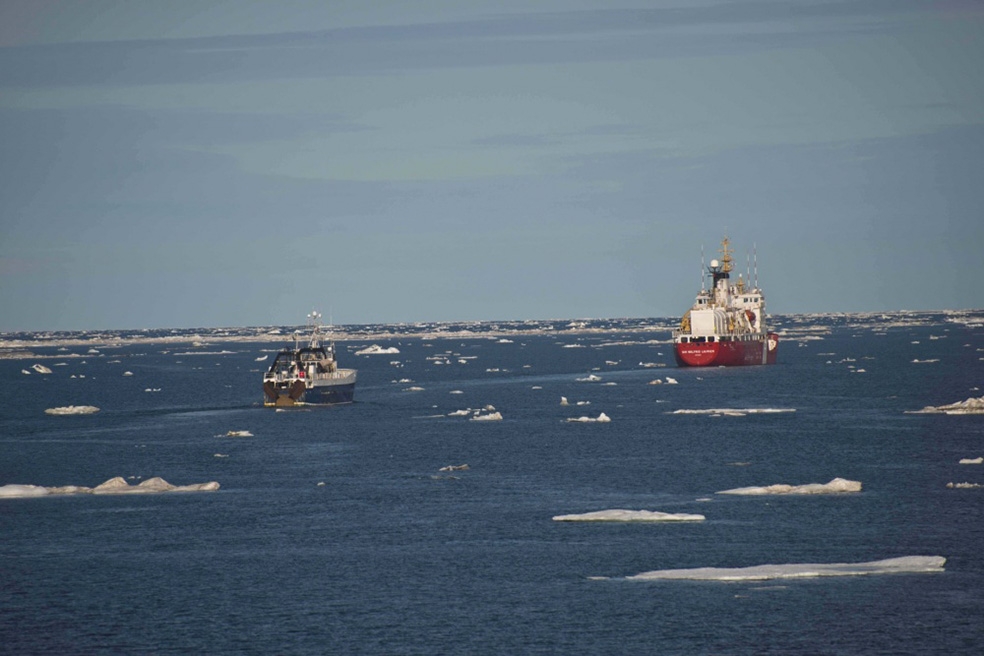If Russia has its way, the Soviet-US Shevardnadze-Baker Agreement could be shelved. Criticized for its fairness and validity, Russia wants to step out of the landmark pact delineating the boundaries of the Bering Strait because it no longer serves Russia’s interests.
In a move that could redraw maritime borders and ignite diplomatic tensions, Russia is contemplating withdrawing from the Shevardnadze-Baker Agreement, a landmark pact delineating the boundaries of the Bering Strait dating back to the Soviet-American era.
The agreement was crafted during the tenure of Soviet Foreign Minister Eduard Shevardnadze and US Secretary of State James Baker.
The statement came during a recent plenary session of the State Duma, where Rosa Chemeris, a member of the Committee on International Affairs, voiced Russia’s reconsideration of the agreement, as reported by The Interfax.
The Shevardnadze-Baker Agreement, signed in 1990 between the Soviet Union and the United States, allocated substantial portions of maritime territory, including approximately 30,000 square kilometers of the USSR’s exclusive economic zone and over 40,000 square kilometers of the shelf, to the United States.

Now, Russian officials are raising concerns about the fairness and validity of the agreement, suggesting that it may no longer serve Russia’s interests.
During a State Duma meeting, Chemeris responded to Deputy Mikhail Matveev’s inquiry regarding which agreement would be denounced next as part of Russia’s monitoring of international treaties with an unfriendly country.
Chemeris said, “Colleagues from the Ministry of Agriculture will confirm, probably the next will be the agreement on cooperation on the Bering Strait, concluded in 1990 between Shevardnadze and US Secretary of State James Baker.”
The potential withdrawal from the treaty was also corroborated by Deputy Minister of Agriculture Maxim Uvaidov, who was also present at the session.
Why Does Russia Want Denunciation Of The Shevardnadze-Baker Pact?
Russian officials have been deliberating on the prospect of denouncing the agreement since 2020, with discussions held among relevant committees in the Federation Council and representatives from key governmental bodies such as the Ministry of Foreign Affairs, the Federal Security Service (FSB), and the Federal Agency for Fishery.
The idea of terminating the Shevardnadze-Baker Agreement and reclaiming control over the economic zone currently administered by the United States was earlier raised by Boris Nevzorov, a senator from the Kamchatka Territory.
Nevzorov argued that the agreement was discriminatory and deprived Russia of approximately 78,000 square kilometers in the Bering Sea, including valuable sections of the continental shelf.
“With the introduction of 200-mile exclusive economic zones between our countries in the area of the Bering and Chukchi Seas, which overlapped each other for 1,500 miles, the delimitation of maritime spaces, in accordance with international practice, should pass along the median line, equidistant from the shores of the two countries. However, due to concessions to Shevardnadze, the border of the disputed areas was drawn along the American orthodromic straight line,” Nevzorov explained.

As a result, he stated, Russia has been deprived of the capacity to harvest over 500,000 tons of fish and crab each year, along with oil and gas reserves valued at hundreds of billions of dollars.
It is worth noting that the agreement, having obtained ratification from the United States in 1992, remained unratified before the Soviet Union’s dissolution.
Following the Soviet Union’s collapse, its successor, the Russian Federation, also refrained from ratifying the agreement. Instead, Moscow opted to provisionally recognize and abide by its stipulations.
The agreement has faced significant opposition in Moscow, primarily due to the perception that Shevardnadze conceded excessively in an attempt to cultivate favor with the Western powers.
This sentiment is widely regarded as a contributing factor to the Russian parliament’s refusal to ratify the deal. However, the latest developments hint at the likelihood of a change in this long-standing stance.
The extent to which Moscow will pursue this matter remains uncertain. Meanwhile, the latest suggestion has emerged amid the State Duma’s latest denunciation of the 1956 agreement, which allowed British fishing vessels access to the Russian zone of the Barents Sea.
On February 21, Russian Deputy Minister of Agriculture Maxim Uvaidov said, “This agreement unilaterally granted preferences to UK fishing vessels to operate in some parts of the Barents Sea, along the coast of the Kola Peninsula and along the coast of Kolguyev Island.”
During the session, Duma Chairman Vyacheslav Volodin remarked, “It’s definitely the first time that we’re considering the termination of an agreement concluded back in Soviet times during this Duma’s tenure, and this is not a pure coincidence.” Nonetheless, the move indicates a broader review of international agreements by Russian authorities.
- Contact the author at ashishmichel(at)gmail.com
- Follow EurAsian Times on Google News




